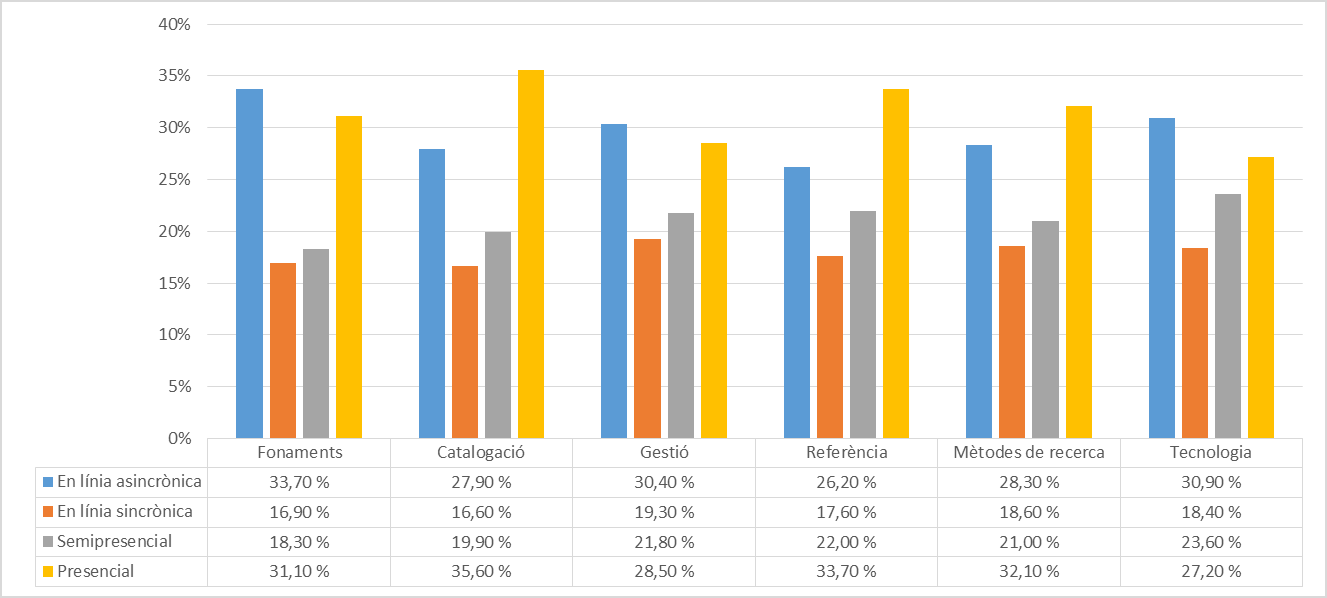Preferències de l’alumnat quant a la modalitat de docència en estudis de biblioteconomia i documentació: el cas dels màsters al Canadà i als Estats Units
Objectiu: examinar les preferències que té l’alumnat dels màsters de biblioteconomia i documentació en la modalitat de la docència (en línia, presencial o semipresencial) i analitzar com aquestes preferències difereixen segons diverses variables demogràfiques. Aquest estudi forma part d’un estudi binacional més extens centrat en les motivacions i les experiències que havien tingut diferents alumnes de màster de biblioteconomia i documentació en relació amb l’educació en línia durant l’últim tram dels seus estudis en institucions acreditades per l’American Library Association (ALA), associació professional encarregada de reconèixer i aprovar els estudis d’aquesta disciplina als Estats Units, Puerto Rico i el Canadà.
Metodologia: enquesta en línia amb l’objectiu de recopilar informació d’estudiants que cursen estudis de màster de biblioteconomia i documentació en centres acreditats per l’ALA, distribuïda amb el suport de l’administració acadèmica i de les associacions d’estudiants dels programes de biblioteconomia i documentació, en la qual participen 1.038 alumnes, pertanyents a trenta-sis programes del Canadà i els EUA, dels quals se seleccionen els que han finalitzat almenys una assignatura en línia, que formen la mostra emprada per a l’estudi (n = 910).
Resultats: hi ha cinc variables amb un valor estadístic significatiu (grup d’edat, situació laboral, tipus de població de residència, distància entre la residència i la universitat, i modalitat dels estudis) que determinen la preferència per un tipus d’impartició docent o una altra en les assignatures principals dels màsters de biblioteconomia i documentació. Així, els estudiants més joves, que tenen una feina a jornada parcial i que resideixen en zones urbanes situades més a prop de la universitat prefereixen una modalitat que requereixi un cert grau d’assistència a classe (presencial o semipresencial), a diferència dels estudiants més grans, amb feines a jornada completa, amb residència en zones rurals situades més lluny de la universitat. — Objectives: This paper reports on Master of Library and Information Science (MLIS) students’ preferences for course delivery (online, blended or face-to-face) and how their preferences differ based on demographic variables. This research is part of a bi-national study that investigated the motivations and experiences that MLIS students had with online education, while completing their graduate degree in an American Library Association (ALA)-accredited institution.
Methodology: The study used an online survey to gather data from Master’s degree students enrolled in LIS programs accredited by ALA, a professional association which accredits programs in the US, Puerto Rico, and Canada. The online questionnaire was administered with the assistance of the administration and their student associations of LIS programs. Thirty-six programs from Canada and the US were represented by the 1,038 students who responded to the online survey. Respondents who had taken and completed at least one online course constituted the sample (n=910) that was used for analysis and the reporting of the results.
Results: The findings show that there were five statistically significant indicators associated with preferred instructional delivery for MLIS core courses: age (generational cohort), employment status, metro status, commute distance, and program modality. The results show that younger students who had part-time employment, resided in urban areas, and lived closer to the campus showed greater preference for a course delivery mode that required some form of in-person instruction (face-to-face or blended) than their older peers who had full-time employment, resided in rural areas, and lived farther from campus.

